News of the Week
Page 22
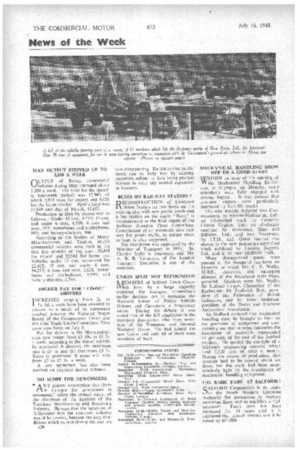
Page 23
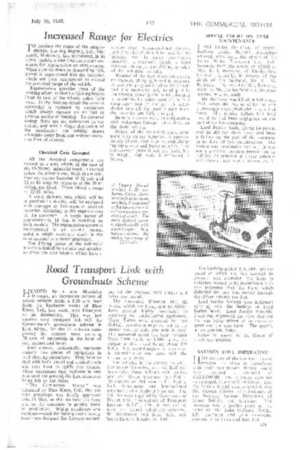
Page 24
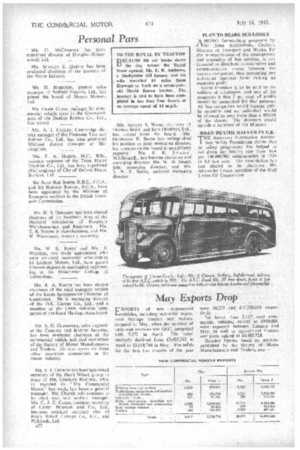
Page 25
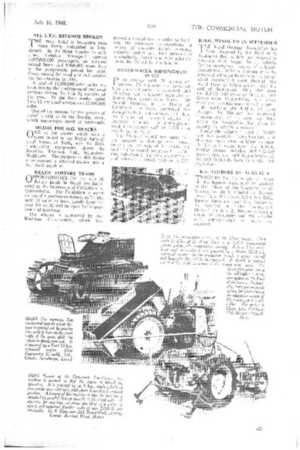
Page 26
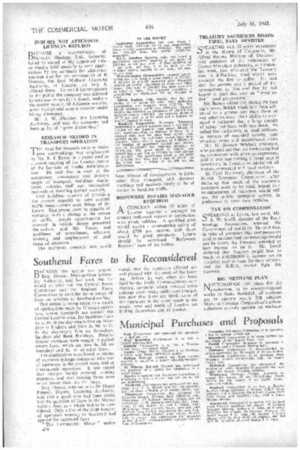
If you've noticed an error in this article please click here to report it so we can fix it.
MAY OUTPUT STEPPED UP TO 3,200 A WEEK
OUTPUT of British commercial N./vehicles during May averaged about 3,200 a week. The total for the month (a four-week period) was 12,940, of which 5,979 were for export and 6,958 for the home market. April's total was 11,849 and that of March, 15,457.
Production in May by classes was as follows:—Under 15 cwt., 4,713; 15 cwt. and tinder 6 tons, 6,558; 6 tons and over, 452; motorbuses and trolleybuses, 913; and battery-electrics, 304.
According to the Society of Motor Manufacturers and Traders, 66.413 commercial vehicles were built in the first five months of the year-30,448 for export and 35,961 for home use. Vehicles under 15 cwt, accounted for 22,425; 15 cwt. and under 6 tons, 34217; 6 tons and over, 2,628, motorbuses and trolleybuses, 5,599; and battery-electrics, I,544.
HIGHER PAY FOR "CO-OP." DRIVERS
I NCREASES ranging from 2s. to 5s. 6d. a week have been awarded to drivers as a result of an agreement reached between the National Wages Board of the Co-operative Union and the Joint Trade Union Committee. They came into force on July 5.
Pay for drivers in the Metropolitan area now ranges from £5 10s. to £6 2s. a week, according to the size of vehicle. In provincial A distr:cts, the minimum rate is £5 Is. and the maximum £5 7s. Rates in provincial B areas will vary from £5 to £5 5s. a week.
A new agreement has also been reached on payment during sickness.
NO SCOPE FOR NEWCOMERS
41 A NY general assumption that there ri• is scope for newcomers is erroneous," States the annual report of the chairman of the Institute of the Furniture Warehousing ahd Removing Industry. He says that the incursion of A-licensees into the removals industry, would be unwise, because the' easy conditions which existed during the war :se
A20 now disappearing. He thinks that public needs can be fully met by existing removers, subject to their being granted licences to meet any normal expansion in business.
BUSES ON RAILWAY STATION?
RECONSTRUCTION of Liverpool IV Street Station on two levels on the existing site, with new public roads and a bus station on the upper "floor," is recommended in the final report of the Railway (London Plan) Committee. Construction of an automatic tube railway for goods traffic, to reduce street cartage, is also suggested.
The committee was appointed by the Minister of Transport in 1944. Sir Charles Inglis is chairman, and Mr. A. B. B. Valentine, of the London Transport Executive, is one of the members. •
UNION SPLIT NOT RECOGNIZED
NAEMBERS of Salford Town ConniVicil have by a large majority endorsed the transport committee's earlier decision not to recognize the National Union of Public Vehicle Drivers and Operators, a breakaway union. During the debate it was stated that of the 835 employees in the transport department who were members of the Transport and General Workers' Union, 726 had joined the new Union and only 60 of them were members of both.
MECHANICAL HANDLING SHOW OFF TO A GOOD START
WITHIN an hour of the opening of IT the Mechanical Handling Exhibition, at Olympia, on Monday, stand attendants were fully engaged with
serious buyers. It was noticed that overseas visitors were particularly interested in fork-lift trucks.
The new models included two CCMveyancers, by Electro-Hydraulics, Ltd.: an oil-engined truck by Coventry Climax Engines, Ltd.; an all-electric machine by Ransomes, Sims and Jefferies, Ltd.; and two Staeatrues. by 1.T.D., Ltd. Great interest was shown in the new pedestrian-controlled truck exhibited by Lansing Bagnall, Ltd., and in its new platform truck.
Many distinguished guests were present at the inaugural luncheon on Monday, at which Mr. C. E. Wallis, M.B.E., chairman and managing director of the Associated Iliffe Press, presided. Speakers were Mr. Wallis, Sir Stafford Cripps, Chancellor of the Exchequer, Sir Frederick Bain, president of the Federation of British Industries, and Sir John Anderson, president of the Docks and Harbour Authorities' Association.
Sir Stafford declared that mechanical handling must be brought to bear on the problems of manpower and cost, pointing out that in some industries the movement of materials represented 85 per cent. of the cost of the finished product. He quoted the example of a Midlands engineering concern which used 3,500 tons of steel a month. During the course of production, that tonnage had to be moved about six times, but the work had been made relatively light by the installation of mechanical handling equipment.
11D. BASIC FARE AT SALFORD?
SALFORD Corporation is to apply to the North Western Licensing Authority for permission to increase motorbus fares and to establish a 14d. minimum. Fares have not been increased for 14 years and it i:i estimated that annual revenue would be raised by £87,000.
APPEAL COURT ON TYRE AINTENANCE
LAST Friday the Court of Appeal (Lord Justice Buck nill dissenting) allowed, with costs, the appeal of the South Wales Transport Co., I.f d., Swansea, from the award of £2,000 to Mrs. E. I. Barkway, of Rhydyrafon, Llanereh, Llanelly, in respect of the death of her husband, Mr. G. M. Barkway. The award to Mrs. Barkway, made by Mr. Justice Sellers at Swansea .Assizes, was set aside.
Mr. Barkway was killed in February, 1943 when tile bus in which he Was a passenger overturned after a tyre had burst. Mr. Justice Sellers had held that there had been negligence on the part of the bus company.
Lord Justice Scott, giving judgment, said he did not think there had been a failure on the part of the company in its duty of tyre maintenance. The system was reasonably careful. It was not a practical business proposition to call for the removal of a tyre unless it was shown there was a reason for it His lordship added that, although the speed at which the bus covered its journey was excessive, the facts in evidence seemed to he inconsistent with any inference that the burst which deflected the bus was caused through the driver driving too fast
Lord Justice Asquith gave judgment agreeing with the findings of Lord Justice Scott. Lord Justice Bucknill, dissenting, expressed the view that the bus was being driven at an excessive speed and the tyre burst. The appeal, in his opinion, failed.
Leave to appeal to the House of lords was granted.
SAVINGS STILL IMPERATIVE
Li AD the cost of the war bc,en shared 1 'between the allies in accordance with their populations, Britain would have received a dividend of t6,000,000.000, but, as things were not so arranged, it was still imperative that the Nation should save to rebuild, said Mr. George Gibson, vice-chairman of the National Savings Movement of Great Britain, last Saturday. The occasion was a garden party at the home of Mn John Oldham, 0.B.E., .P., chairman and joint managing director of Oldham and Son, Ltd.
PLAN TO SHARE BUS LOSSES
AMONO far-reaching proposals by Sir _John Kotalawala,• Ceylon's Minister of Transport and Works, for the re-organization of the management and operation of bus services, is on intended to distribute remunerative and unremunerative routes between the various companies, thus preventing any individual operator from making an excessive profit.
Great attention is to be paid tothe welfare of employees, and one of the proposals is that 5 per cent. of profits should be earmarked for that purpose. All bus companies would become public concerns and no individual would be allowed to own more than a fiftieth of the shares. The directors would include a nominee of the Minister.
ROAD DEATHS HALVED IN U.S.
THE American Automotive Association Safety Foundation claims that its safety programme has helped to cut down the fatality rate from 16.4 per 100,000,000 vehicles-miles in 1934 to 8.6 last year. The Foundation has just elected as its chairman Mr. Alexander Fraser, president of the Shell Union Oil Corporation.
ALL L.T.E. RECORDS BROKEN
THE travel habit is becoming even more firmly embedded in Londoners. In the three months to midJune, London Transport carried 1,097,000,000 passengers, an all-time record figure and 9,000,000 more than in the comparable period last year. Every record for road and rail services has been broken in 1948.
A total of 11,000,000 extra miles has been run by the Underground and road services during the first 5i months of the year. In the four weeks ended June 12, the road services ran 33,000,090 miles.
One of the reasons for the growth of travel is said to be the five-day week, which encourages travel at week-ends.
MEDAL FOR D.G. TRACKS
ONE of the entries which won a silver medal in the Royal Agricultural Show, at York, was the D.G. track-laying equipment; shown by Roadless Traction, Ltd., Hounslow, Middlesex. The purpose of this device is to convert a wheeled tractor into a half-track machine.
BRAZIL FOSTERS TRADE
OPPORTUNITIES for the sale of British goods in Brazil are facilitated by the International Exhibition, at Quitandinha. The Exhibition is more or less of a permanent nature, is .for the next 10 years at least, goods from all over the world will be open for inspection and purchase.
The scheme is sponsored by the Brazilian Governtnent, . which has passed a special law in order to facilitate the necessary arrangements in respect of customs duties, currency exchange and so on. Full information is obtainable from Count Alexandre De Lasta, 86, Piccadilly, London, W.I.
ROADS WRECK BIRMINGHAM BUSES IN an average week, 70 springs arc 1 broken, 36 radiators are loosened. four chassis frames are fractured. and 20 wheel repairs become necessary on Birmingham Corporation hoses. Sir Patrick Hannon, in the House of Commons last week, attributed this damage to had road surfaces, and asked the Minister of Transport whether he intended to insist that Birmingham's road maintenance staff of 1,348 inert should he cut by 271.
1 he ‘linisher would not aeree that the increase in damage was caused entirely by the state of the roads, hut said that he would not press for a further reduction in the road maintenance staff. wh:ch had ii read been cu. to, 255.
R.H.O. WINDS UP IN SEPTEMBER
THE Road Haulaee Association has been informed by the Minister of Transport that he does not propose to continue after August 16 the scheme for an emergency reserve of vehicles. Government traffic will continue to be allocated amongst hauliers at the recognized commercial rates through the Road Haulage Organization until the end of September. After that date the R.H.O. will cease to funetOm. and Government Departments will make their own arrangements with hauliers.
In notifying the R.H.A. of these changes, the Minister has expressed " appreciation of the' very real help ohreh the Association has given in making the scheme a success.— Under the scheme a total of 70,000 tons was available from hatiFers. and this Was more than sufficient to meet all the calls made upon the R.H.A. • raffles carried included prefabricated houses, open-cast and deep-mined coal, fish and foodstuffs from the ch‘eks. and explosives.
BA. TENDERS BY AUGUST 4
TENDERS for the supply of buses 1 for Buenos Aires must be received at the offices of the Corporacion de Transpories de la Ciudad de Fluenos Aires. Calle Bartolome Mitre No_ 3342, Buenos Aires, not later than August 4. As reported in " The Commercial Motor " on July 1 300 buses seating about 20 passengers and 900 vehicles with approximately 40 seats are reou i red.
INQUIRY NOT ATTENDED: LICENCES REFUSED BECAUSE a representative of Parrott's Haulage, Ltd., Grimsby, failed to attend at the appointed time an inquiry held specially to hear applications by the company for additional tonnage and for the continuance of B licences, the East Midland Licensing Authority, at Lincoln, on July 8, refused them. To avoid inconvenience to thi public the company was allowed . to continue to run for a month, under a short-term permit, 20 A-licence vehicles, seven trailers and certain vehicles under hiring allowance.
Mr. J. W. .Fletcher, the Licensing Authority, said that the company had been guilty of " gross discourtesy."
RESEARCH NEEDED IN TRANSPORT OPERATION
THE need for research units in transport undertakings was emphasized by Mr. R. J. Eaton in a paper read at a recent meeting of the London centre of the Ins'itute of Traffic Administration. He said that in each of the acceptance. conveyance and delivery stages of transport, buildings, equipment, vehicles, staff and mechanical methods of handling invited research.
Unit building: capable of providing the correct capacity to meet current traffic requirements were things of the future. Equipment must be capable of variation with a change in the nature of traffic. Ample opportunities for research in vehicle design presented theRiselves. said Mr. Eaton, and problems of recruitment, selection. training and employment of staff required attention.
The transport research unit could keep abreast of developments in fields other than transport, and discover machines and methods likely to be of service in handling traffic.
BODYWORK REPAIRS MANAGER REQUIRED
ACONCERN within 20 miles of London requires a manager to control bodywork repairs in connection with goods vehicles. A qualified man would receive a commencing salary of about 000 per annum, and there would be good prospects. Letters should be addressed " Bodywork Repairs." care of the Editor.
FIRST, SAYS MINISTER
QPEAKING with 22 years' experience %.../ in the House of Commons, Mr. Alfred Barnes, Minister of Transport, told members of the Federation of Coated Macadam Industries, in London, last week, that whenever the Treasury was in difficulties, road works were amongst the first to suffer. He said that the present was a period of disappointment to him and that he had hoped to start this year an " imaginative " road programme.
Mr. Barnes added that during the past eight years, British roads had been subjected to a greater test thati. those of any other country. Their ability to withstand it indicated that a large margin of safety had been built into them. He called for uniformity in road surfaces, in matters of non-skid quality, construction costs and maintenance costs.
Mr. M. Stewart Mitchell, chairman, who pointed out that the Federation had no connection with price arrangements, said it was establishing a large central laboratory in London to advise on all matters connected with road surfaces.
Sir Cyril Hurcomb, chairman of the British Transport Commission, after declaring that much of the country's transport must be by road, hoped that man'ufacturers of macadam would still use the public transport system, in preference to their own vehicles.
TAX ON COMPENSATION
Q PEAKING at Luton, last week, Mr. N.-) R. W. Sewill, director of the Road Haulage Association, accused the Government of bad faith. He said that, in spite of promises that compensation paid to nationalized undertakings would not be taxed, the Treasury intended to
levy income tax on it. Mr. Sewill declared that hauliers might lose as much as £10,000,000 in income tax on the price paid to them for their vehicles, and the R.H.A. would fight this injustice.
BIG METHANE PLAN
MOTTINGHAM has plans for the
'41 production, at its sewage-disposal works at Stoke Bardolph, of methane gas to oPerate nearly 200 vehicles. Many of Croydon Corporation's refusecollectors already operate on methane.












































































